BMW X1 vs Hyundai Tucson Plug-In Hybrid – Differences & Prices Compared
Compare performance, trunk space, efficiency, and price at a glance.
Find out now which car suits you better – the BMW X1 or the Hyundai Tucson Plug-In Hybrid?
The BMW X1 (SUV) comes with a Gasoline engine and Automatic transmission. In comparison, the Hyundai Tucson Plug-In Hybrid (SUV) features a Plug-In Hybrid engine and Automatic transmission.
If you're looking for more power, decide whether the 312 HP of the BMW X1 or the 268 HP of the Hyundai Tucson Plug-In Hybrid better fits your needs.
The BMW X1 offers a fuel efficiency of 23 mpg, compared to for the Hyundai Tucson Plug-In Hybrid.
Price-wise, the BMW X1 starts at 41400 $, while the Hyundai Tucson Plug-In Hybrid is available from 39600 $. Compare all details and see which model fits your lifestyle best!
BMW X1
The BMW X1 stands out in the compact luxury SUV segment with its impressive balance of style and practicality. This vehicle offers an upscale interior and advanced technology features, making it a favored choice for those seeking both comfort and innovation. Its nimble handling and efficient powertrain provide a dynamic driving experience, appealing to urban commuters and adventure seekers alike.
details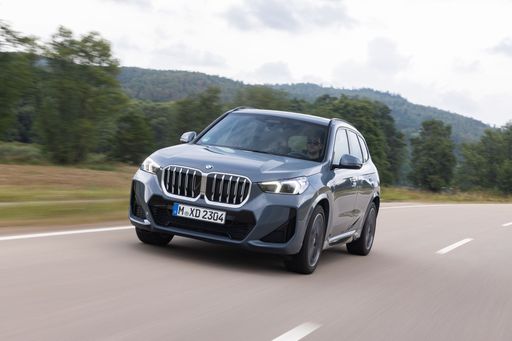 @ press.bmwgroup.com
@ press.bmwgroup.com
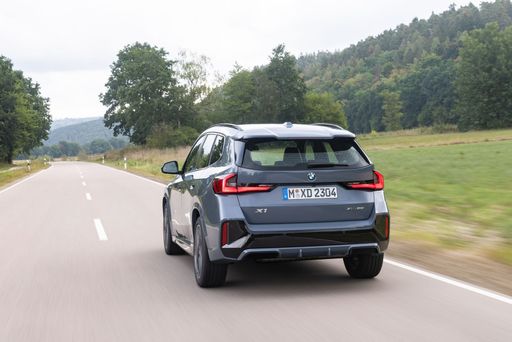 @ press.bmwgroup.com
@ press.bmwgroup.com
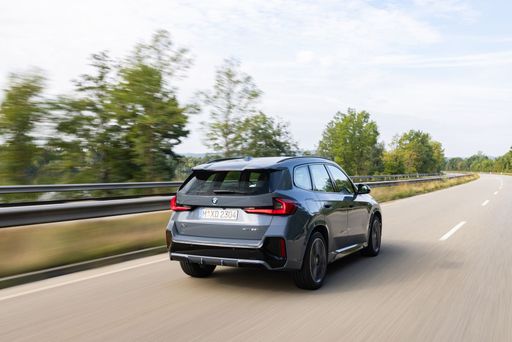 @ press.bmwgroup.com
@ press.bmwgroup.com
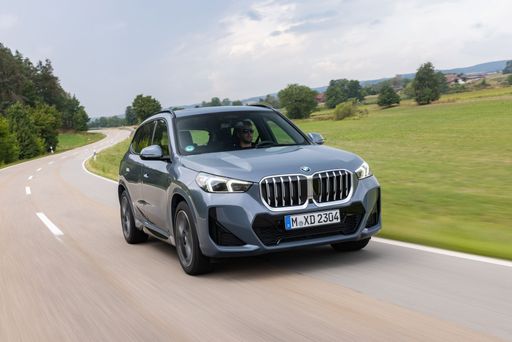 @ press.bmwgroup.com
@ press.bmwgroup.com
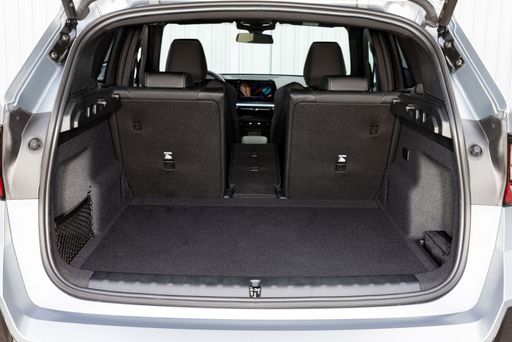 @ press.bmwgroup.com
@ press.bmwgroup.com
Hyundai Tucson Plug-In Hybrid
The Hyundai Tucson Plug-In Hybrid seamlessly blends modern design with eco-friendly technology, offering an appealing option for the environmentally conscious driver. Its advanced hybrid system allows for both efficient fuel use and extended electric driving capability, ensuring versatility for various driving needs. The spacious and stylish interior complements the innovative features, making the Tucson Plug-In Hybrid an attractive choice for those seeking a balance of performance and sustainability.
details @ hyundai.news
@ hyundai.news
 @ hyundai.news
@ hyundai.news
 @ hyundai.news
@ hyundai.news
 @ hyundai.news
@ hyundai.news
 @ hyundai.news
@ hyundai.news

|

|
|
|
|
Costs and Consumption |
|
|---|---|
|
Price
41400 - 50800 $
|
Price
39600 - 47300 $
|
|
FuelEconomy City
23 mpg
|
FuelEconomy City
-
|
|
FuelEconomy Hwy
31 MPG
|
FuelEconomy Hwy
-
|
|
Electric Range
-
|
Electric Range
-
|
|
Battery Capacity
-
|
Battery Capacity
-
|
|
Fuel tank capacity
14.30 gal
|
Fuel tank capacity
11.10 gal
|
Dimensions and Body |
|
|---|---|
|
Body Type
SUV
|
Body Type
SUV
|
|
Seats
5
|
Seats
5
|
|
Doors
-
|
Doors
-
|
|
Curb weight
3750 - 3790 lbs
|
Curb weight
4121 - 4265 lbs
|
|
Trunk Volume
-
|
Trunk Volume
-
|
|
Length
177.2 - 177.4 in.
|
Length
182.70 in.
|
|
Width
72.60 in.
|
Width
73.40 in.
|
|
Height
64 in.
|
Height
66 in.
|
Engine and Performance |
|
|---|---|
|
Engine Type
Gasoline
|
Engine Type
Plug-In Hybrid
|
|
Transmission
Automatic
|
Transmission
Automatic
|
|
Drive Type
All Wheel
|
Drive Type
All Wheel
|
|
Power HP
241 - 312 HP
|
Power HP
268 HP
|
|
Torque
295 lb-ft
|
Torque
258 lb-ft
|
|
Number of Cylinders
-
|
Number of Cylinders
-
|
|
Engine Displacement
2 L
|
Engine Displacement
1.60 L
|
|
Gears
-
|
Gears
-
|
General |
|
|---|---|
|
Model Year
2025
|
Model Year
2025
|
|
Brand
BMW
|
Brand
Hyundai
|
BMW X1
Exploring the 2025 BMW X1: The Evolution Continues
The 2025 BMW X1 solidifies its position as a leading choice in the luxury compact SUV segment, offering a compelling blend of style, technology, and performance. With dynamic enhancements, this iteration marks a significant evolution from its predecessors. Let's delve into the new features and technical specifications that define this latest version.
Performance That Impresses
Under the hood, the 2025 BMW X1 boasts two robust gasoline engine options, tailored to cater to different driving preferences. For those seeking maximum power, the 312 HP version provides an exhilarating drive, supported by a torque of 295 lb-ft. This powerhouse pairs with an automatic transmission system, ensuring smooth gear transitions and enhancing the all-wheel-drive experience.
For drivers preferring a slightly less aggressive yet efficient engine, the 241 HP version still delivers impressive acceleration and robust performance. Regardless of the engine choice, both versions feature a 2.0-liter engine displacement, optimizing fuel efficiency while maintaining a thrilling drive.
Efficiency That Counts
The BMW X1 does not compromise on fuel economy. With a city fuel economy rating of 23 mpg and a highway rating of 31 mpg, the SUV strikes an excellent balance between performance and efficiency. This allows drivers to enjoy longer journeys with fewer fuel stops, courtesy of a 14.3-gallon fuel tank capacity.
Design and Dimensions
In terms of design, the 2025 BMW X1 maintains its sleek and aerodynamic presence, measuring at a length of 177.4 inches, a width of 72.6 inches, and a height of 64 inches. The intelligently crafted dimensions contribute to its distinct road presence while optimizing interior space. Comfortably seating up to five passengers, the interior promises luxury and spaciousness in equal measure.
Innovative Features Enhance the Experience
BMW’s commitment to innovation is evident in the X1's advanced technology package. Drivers and passengers are treated to an array of smart features designed to enhance comfort, safety, and entertainment on every journey. From state-of-the-art infotainment systems to adaptive safety features, the 2025 BMW X1 ensures that every drive is enjoyable and secure.
Conclusion
The 2025 BMW X1 exemplifies modern SUV excellence, blending performance, efficiency, and advanced technology. Its refined design, coupled with powerful engine options, sets a new standard in its class. For discerning drivers seeking a compact luxury SUV that excels in both urban settings and open roads, the BMW X1 remains an outstanding choice.
Hyundai Tucson Plug-In Hybrid
Exploring the Hyundai Tucson Plug-In Hybrid: Future-Forward Efficiency
The Hyundai Tucson Plug-In Hybrid is an impressive blend of cutting-edge technology and robust performance wrapped in the form of a versatile SUV. As the automotive industry steadily shifts toward sustainable energy solutions, the Tucson Plug-In Hybrid stands out as a flagship in Hyundai's lineup. With a sleek design and innovative hybrid technology, this model represents an evolution in driving experiences.
Performance Meets Efficiency
The 2025 Hyundai Tucson Plug-In Hybrid comes equipped with a potent 1.6-liter plug-in hybrid engine, delivering an impressive output of 268 HP. The powertrain is configured with an automatic transmission and all-wheel-drive, ensuring not only a responsive drive but also the capability to handle diverse road conditions. This model strikes a balance between performance and efficiency, providing torque of 258 lb-ft.
Designed to cater to today's eco-conscious driver, the Tucson Plug-In Hybrid offers an efficient hybrid system without compromising on power, achieved through its seamless transition between electric and engine-assisted driving. This ensures a smooth ride whether you're navigating urban streets or exploring rural terrains.
Technological Innovations and Interior Comfort
The Tucson Plug-In Hybrid is not just about what lies under the hood; it also features a modern, tech-savvy interior designed to enhance the driving experience. With a focus on connectivity, the vehicle includes advanced infotainment systems compatible with the latest digital interfaces, providing a rich in-car experience for all five seats.
Innovation extends beyond entertainment, as the Tucson Plug-In Hybrid offers a suite of driver assistance technologies. These systems work cohesively to improve safety and driver confidence, setting new standards for intuitive in-vehicle systems.
Design and Dimensions
The Hyundai Tucson Plug-In Hybrid embodies a sophisticated design with dimensions that favor a balanced profile and spacious interior. Measuring 182.7 inches in length, 73.4 inches in width, and 66 inches in height, the SUV offers a substantial footprint that translates into ample cabin space. This thoughtful design ensures passenger comfort while maximizing cargo capacity.
Despite its robust build, with a curb weight ranging from 4,121 to 4,265 lbs, the Tucson Plug-In Hybrid maintains agility and efficiency, highlighting Hyundai's commitment to innovation in automotive design.
The Future with Hyundai
The 2025 Hyundai Tucson Plug-In Hybrid is more than just a vehicle; it is a glimpse into the future of automotive design and efficiency. With models that include the 456001 and 456002 variations, Hyundai continues to expand its hybrid offerings, pushing the envelope for sustainable driving solutions while maintaining the brand's legacy of reliability and performance.
Whether you're focused on reducing your carbon footprint or simply desire a dynamic driving experience, the Hyundai Tucson Plug-In Hybrid provides an exceptional combination of luxury, technology, and eco-friendly engineering.
How much does the BMW X1 cost?
The BMW X1 starts at 41400 $.
The prices and data displayed are estimates based on USA list prices and may vary by country. This information is not legally binding.
